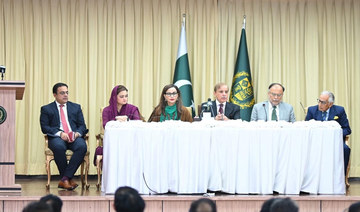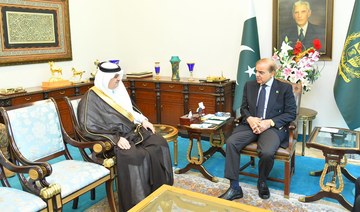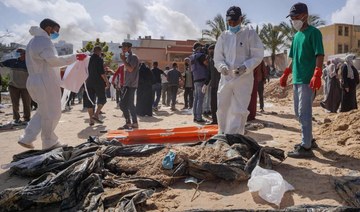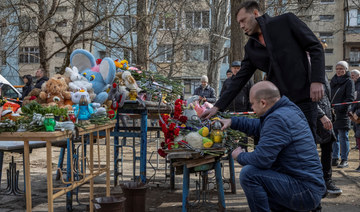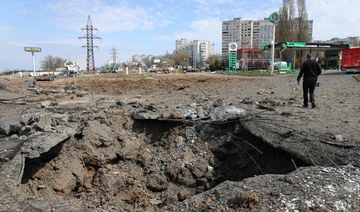NEW YORK CITY: Pakistan’s permanent representative to the UN, Munir Akram, remembers the day the recent floods that would eventually submerge a third of his country began.
“The extreme heat melted the glaciers,” he said. “We have 7,000 glaciers in the mountains of Pakistan. This resulted in flash floods. And then the extreme heat led to high precipitation, which resulted in the massive torrential rains that came.
“It is perhaps difficult to imagine the magnitude of the disaster and this became clear to all of us, and to the world, as the waters ran over the rivers into the villages, towns, fields, destroying 7,000 kilometers of roads, 300 bridges, over a million homes, seven million acres of standing crops.”
During a visit to the country this month, UN Secretary-General Antonio Guterres described the situation in Pakistan as “climate carnage.” He had never seen anything like it on this scale before, he said, as the flooded land covered an area three times the size of his own country, Portugal.
This disaster of monumental magnitude has resulted in more than 1,400 deaths, and caused damage estimated at more than $30 billion. A catastrophe of hitherto unimaginable proportions, it has once again propelled the issue of climate change to the top of the international agenda, dominating every discussion during the annual gathering of world leaders at the UN General Assembly in New York this month.
“This is the consequence of climate change, of global warming,” Akram told Arab News on the sidelines of the UN event. “And the supreme irony is that Pakistan is not responsible for global warming; we emit only 0.8 percent of global carbon emissions and yet Pakistan is the most significantly impacted country by this.
“I think the (UN) secretary-general has spoken eloquently about that when he visited the affected areas and he has called for massive assistance to Pakistan, not only as a humanitarian gesture but also as part of, like, climate justice.
“It is unjust that Pakistan should face the consequences of the actions of those who are the largest emitters and have been the largest emitters for so many decades.”
China, the US and the nations that make up the membership of the EU are the three largest global emitters of greenhouse gases, which cause the Earth’s surface and lower atmosphere to warm.
Guterres has for years called for the biggest producers of greenhouse gases not only to lower their emissions but also to finance the response to the effects of climate change in less-wealthy countries and regions — such as Pakistan, drought-hit Horn of Africa, and the Small Island States that are also particularly vulnerable to flooding — when they face extreme weather events resulting from those emissions.
“I think that all the honest people around the world recognize that global warming and climate change is a reality and that it is having very enormous impacts around the world, especially on developing countries,” said Akram.
“Therefore there is a growing support for the proposal of the developing countries that at least $100 billion should be provided annually for climate finance, that at least half of this should go to adaptation — so far, it’s only 20 to 25 percent of those (funds that go) for adaptation — and that when countries such as Pakistan (are) damaged so grievously, to the extent of 10 percent of the gross domestic product, that there is a responsibility on the part of the international community, especially those who have a historical and current responsibility for having the highest emissions, to provide support in the recovery of countries which suffer from the impact.”
Pakistan is putting forward a proposal for the creation of a financial facility that would be permanently available to compensate countries for the effects of climate change. This is in addition, Akram said, to Islamabad’s suggestion that climate-adaptation efforts, often deemed the “orphan child” of climate talks, should receive at least 50 percent of all climate financing, along with an increased emphasis on the importance of speeding up mitigation efforts, “especially by those who are the highest emitters and who have been historically the highest contributors to global warming over the last 150 years.”
Turning to the situation in neighboring Afghanistan, the Pakistani envoy expressed “disappointment” at the human rights record of the Taliban in the year since they took over the country by force following the withdrawal of Western forces in August last year.
“We are all disappointed that some of the promises that were made with regard to human rights, women’s rights and counterterrorism have not been fulfilled and it remains a priority for us to promote those objectives,” Akram said.
However he added that it would be counterproductive to disengage from talks with the Taliban government or to try to isolate and punish it. He said such actions would condemn the entirety of the Afghan population to further suffering and starvation “and that is certainly not the objective of the international community.”
Akram urged the global donors to continue to provide humanitarian assistance to Afghanistan and engage in the economic revival of the country, including improvements to its banking system. He also called for the nation to be allowed to use the resources available to it, including the release of overseas assets currently frozen by the international community. Pakistan is actively engaged in this process, he added.
Calling for “a pathway for normalization” as a major weapon in the fight against terrorism, Akram urged the Taliban to “take effective action not only against (Daesh), which is of course the major concern for the international community, but also against terrorist organizations such as the TTP (Tehrik-i-Taliban Pakistan), which is not only threatening but actually resorting to cross-border attacks against Pakistan.”
The plight of women in Afghanistan under the Taliban is another topic that has dominated discussions during the UN General Assembly, with Afghan women living in exile making the case for their compatriots in a country that is the only one in the world that actively denies women the right to an education. They have called on world leaders to label the regime’s actions against women as “gender apartheid,” in the hope the term will become a catalyst in Afghanistan for change in terms of the treatment of women, just as it once did in South Africa on issues of race relations.
Pakistan’s foreign minister, Bilawal Bhutto Zardari, told Arab News last week that the plight of women in Afghanistan should be an issue not only for the wider international community but for the Muslim world in particular because “Islam is what gave women their rights. Islam is what protects women’s rights.”
Akram believes in pursuing “a strategy of persuasion” with the Taliban on the issue.
“We need to convince the Taliban that their position on this issue is out of step with the requirements of human rights, Islamic law or Islamic practice as such, and we are fully behind this,” he said.
“All we say is let’s do it in a way of persuasion, of trying to convince them through (for example) illustration of best practices in the Islamic world of how women are treated and how women are contributing to the welfare of the nations.
“And perhaps the Taliban — at least those who are younger, educated and know the world — will soon come to be convinced that this is the right way to do it. And hopefully, Afghanistan will then emerge into a stage of development that is more consistent with international norms.”
All honest people recognize global warming is real, says Pakistani envoy
https://arab.news/zzwce
All honest people recognize global warming is real, says Pakistani envoy
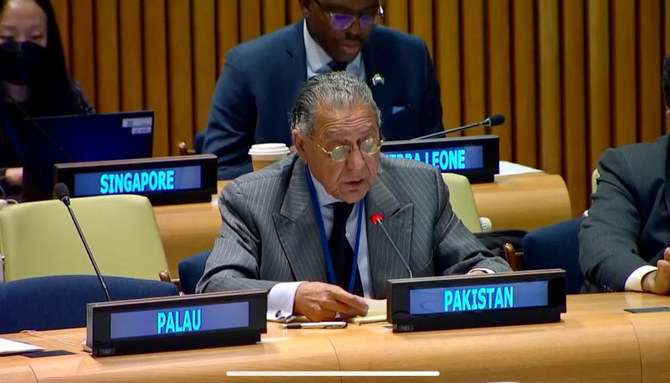
- Munir Akram told Arab News his country is proposing the creation of a financial facility that would be permanently available to compensate countries for the effects of climate change
- He said he is ‘disappointed’ with the rights record of the Taliban in Afghanistan but added it would be counterproductive to break off from talks with them and isolate the government
Major arrests at NYU campus as Gaza protests spread
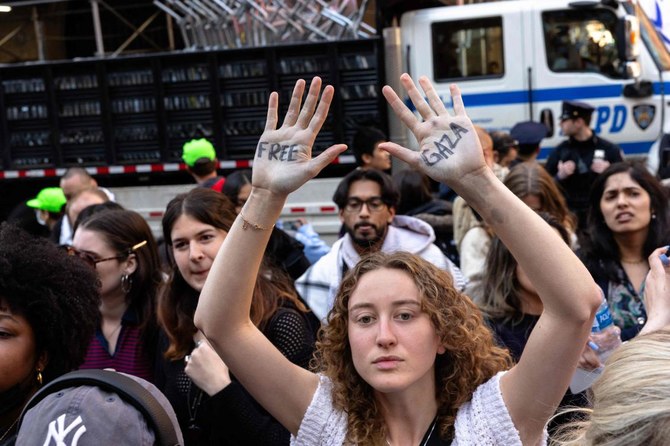
Some of America’s most prestigious universities have been rocked by protests in recent weeks as students and other agitators take over quads and disrupt campus activities.
The demonstrations come amid sweeping debates over Israel’s assault on Gaza, following Hamas’s deadly invasion on October 7.
Such bastions of higher education — Harvard, Yale, Columbia and others — are grappling for a balance between students demanding free speech rights and others who argue that campuses are encouraging intimidation and hate speech.
On Tuesday, the New York Police Department told AFP that 133 people had been arrested at NYU and released after being issued with court summons, as protests also intensify at Yale, Columbia University and other campuses.
As the holiday of Passover began Monday night, police began detaining demonstrators at an encampment at NYU who had earlier refused orders to disperse.
A New York University spokesman said the decision to call police came after additional protesters, many of whom were not thought to be affiliated with NYU, suddenly breached the barriers erected around the encampment.
This “dramatically changed” the situation, the spokesman said in a statement on the school’s website Monday, citing “disorderly, disruptive and antagonizing behavior” along with “intimidated chants and several antisemitic incidents.”
“Given the foregoing and the safety issues raised by the breach, we asked for assistance from the NYPD. The police urged those on the plaza to leave peacefully, but ultimately made a number of arrests.”
The spokesman said the school continues to support freedom of expression and the safety of students.
But protests have grown large and disruptive enough — New York Police Department spokesmen have spoken of their officers facing violence when confronting protesters at NYU — to draw the attention of President Joe Biden and his administration.
“Anti-Semitic hate on college campuses is unacceptable,” US Secretary of Education Miguel Cardona posted on X on Tuesday, expressing concern about the unrest.
The protests began last week at Columbia University, also in New York, with a large group of demonstrators establishing a so-called “Gaza Solidarity Encampment” on school grounds.
But more than 100 protesters were arrested after university authorities called the police onto Columbia’s campus Thursday, a move that seemingly escalated tensions and sparked a greater turnout over the weekend.
Social media images late Monday appeared to show pro-Palestinian Jewish students holding traditional seder meals inside the protest areas on campuses including at Columbia.
There were also demonstrations at MIT, the University of Michigan, UC Berkeley and Yale, where at least 47 people were arrested Monday after refusing requests to disperse.
France arrests eight in PKK financing probe
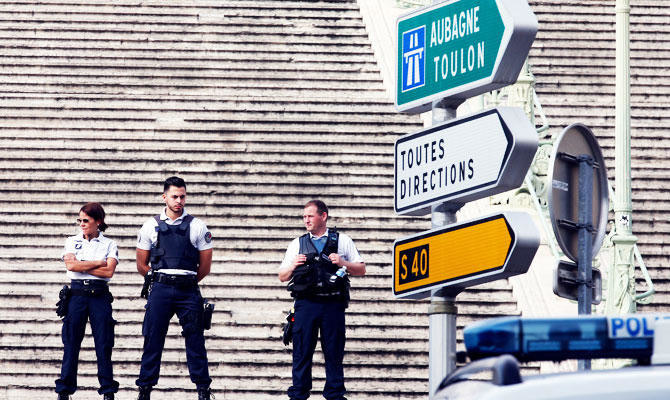
- The arrests took place in the Paris region and in southern France, the PNAT anti-terror unit said
- French prosecutors suspect the eight of preparing and financing terrorist acts
PARIS: French police arrested eight men on Tuesday as part of an investigation into the finances of the Kurdistan Workers Party (PKK), banned as a terror organization by Turkiye and its Western allies, anti-terrorism prosecutors told AFP.
The arrests took place in the Paris region and in southern France, the PNAT anti-terror unit said.
The PKK has been designated a terrorist organization by Turkiye, the United States and the European Union.
French prosecutors suspect the eight of preparing and financing terrorist acts, and of conspiring to extort, or attempt to extort, funds to finance a terrorist organistion between 2020 and 2024, the PNAT said.
Investigators believe the eight to be connected to a campaign to collect funds from Kurdish business people and other Kurds in France, a source close to the case added.
Police can hold the suspects for up to 96 hours for questioning, the source said.
Another source said the funds were destined for use in Belgium, where police on Monday raided Kurdish-run media as part of a probe undertaken at the request of a French anti-terror judge, the PNAT said.
The PKK has waged a decades-long insurgency for greater autonomy for the Kurdish minority of Turkiye in the southeast of the country, in a standoff with the Ankara government that remains unresolved to this day.
Dutch intelligence sees the wars in Gaza and Ukraine as triggers for terrorist threats
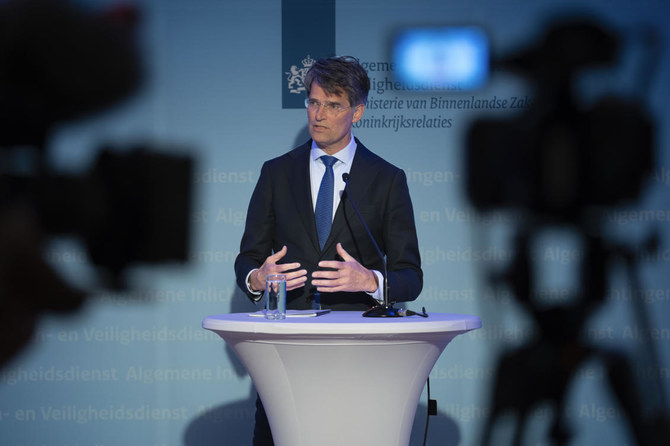
- The Israel-Hamas war in Gaza and the destruction of a Qur’an outside parliament last year are “trigger events” for extremists
- “The terrorist threat is serious at this moment,” the agency’s director-general, Erik Akerboom, told AP
ZOETERMEER, Netherlands: The Dutch national intelligence agency said Tuesday that threats targeting the Netherlands are increasingly connected to worldwide turmoil, including the wars in Gaza and Ukraine.
Although the number of terror attacks across Europe has been down in recent years, the General Intelligence and Security Service in its annual report said the Israel-Hamas war in Gaza and the destruction of a Qur’an outside parliament last year are “trigger events” for extremists.
“The terrorist threat is serious at this moment,” the agency’s director-general, Erik Akerboom, told The Associated Press.
Akerboom said he is particularly concerned about big events, noting that the agency is working closely with French authorities to prevent incidents during the Paris Olympics this summer.
In December, the Dutch counterterrorism agency increased the country’s threat alert to its second-highest level because of concerns about the Daesh group’s Khorasan affiliates, Akerboom said. IS-K, a Central Asian affiliate, was responsible for the attack at a suburban Moscow concert hall that killed at least 133 people in March.
According to the new report, “global jihadism has been the greatest terrorist threat for years in the Netherlands.” Incidents such as the one last April, when an anti-Islam activist tore pages from the Qur’an in front of the Dutch parliament building, put the Netherlands on the map of targets.
About a dozen terror attacks were thwarted by authorities in Europe last year and in four cases, suspects were arrested in the Netherlands, the report said. None of those attacks was focused on the Netherlands, according to Akerboom.
The Dutch also see threats from China, in particular cyberattacks, as a major concern. Akerboom said China is producing more hackers to break into Dutch systems than the Dutch can produce to defend them. The security service has cited China as the biggest threat to the country’s economic security.
Russia also continues to pose a risk to the Netherlands amid Moscow’s full-scale invasion of Ukraine. So-called peace protests in Amsterdam which call for the Dutch to stop sending arms to Ukraine have included demonstrators paid by Russian sources to attend and given prefabricated slogans, the security service has asserted.
The Netherlands is of particular interest to Moscow in part because of the international institutions housed here, including the International Criminal Court. The Hague-based court is investigating crimes in Ukraine and has issued arrest warrants for President Vladimir Putin and other Russians.
Sunak says UK to raise defense spending amid global threats
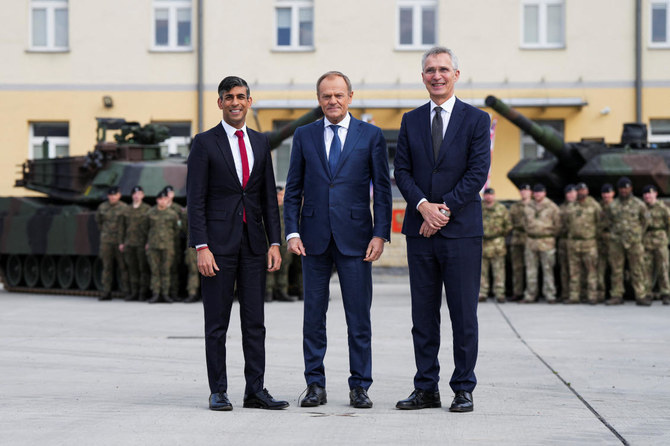
- “In a world that is the most dangerous it has been since the end of the Cold War, we cannot be complacent,” Sunak told reporters
- The increase in spending from 2.3 percent will see the UK become one of the highest spenders on defense in the 32-member defense alliance
WARSAW: Britain will raise defense spending to 2.5 percent of GDP by 2030 in a “most dangerous” world, Prime Minister Rishi Sunak said Tuesday during a visit to Poland.
The commitment came as NATO countries face pressure to raise defense spending in the face of global threats, particularly from Russia.
“In a world that is the most dangerous it has been since the end of the Cold War, we cannot be complacent,” Sunak told reporters in Warsaw, where he held a press conference with NATO Secretary-General Jens Stoltenberg.
The increase in spending from 2.3 percent will see the UK become one of the highest spenders on defense in the 32-member defense alliance after the United States, the British government said.
It means the UK is expected to spend £87 billion on defense in 2030-31, an increase of £23 billion over current levels.
“I believe we must do more to defend our country, our interests, and our values,” Sunak said, announcing “the biggest strengthening of national defense for a generation.”
Western nations are under pressure to boost defense funding following Moscow’s invasion of its neighbor Ukraine as well as the threat of escalation in the Middle East.
EU chief Ursula von der Leyen recently called for a “European awakening on defense and security.”
Brussels is set to come up with more proposals for financing the defense push by a summit of EU leaders in June.
Sunak has also faced calls from his Conservative Party to boost defense spending, with some calling for a level of three percent of GDP.
On Tuesday, Sunak also announced £500 million additional funding for Ukraine’s war effort against Russia.
A Russian strike on Kharkiv’s TV tower is part of an intimidation campaign, Ukraine’s Zelensky says

- Kharkiv region straddles the approximately 1,000-kilometer front line where Ukrainian and Russian forces have been locked in battle for more than two years
- “Four priorities are key: defense of the sky, modern artillery, long-range capacity, and to ensure that packages of American aid arrive as soon as possible,” Zelensky said
KYIV: Ukrainian President Volodymyr Zelensky said a Russian missile strike that smashed a prominent skyline television tower in Kharkiv was part of the Kremlin’s effort to intimidate Ukraine’s second-largest city, which in recent weeks has come under increasingly frequent attack.
The strike sought to “make the terror visible to the whole city and to try to limit Kharkiv’s connection and access to information,” Zelensky said in a Monday evening address.
The northeastern Kharkiv region straddles the approximately 1,000-kilometer (600-mile) front line where Ukrainian and Russian forces have been locked in battle for more than two years since Moscow’s full-scale invasion of Ukraine. The front line has changed little during a war of attrition, focused mostly on artillery, drones and trenches.
Since late March, Russia has stepped up the pressure on Kharkiv, apparently aiming to exploit Ukraine’s shortage of air defense systems. It has pounded the local power grid and hit apartment blocks.
On Monday, a Russian Kh-59 missile struck Kharkiv’s 250-meter (820-foot) -high TV tower, breaking it roughly in half and halting transmissions.
A Washington think tank said Russia may be eyeing a ground assault on Kharkiv.
“The Kremlin is conducting a concerted air and information operation to destroy Kharkiv City, convince Ukrainians to flee, and internally displace millions of Ukrainians ahead of a possible future Russian offensive operation against the city or elsewhere in Ukraine,” the Institute for the Study of War said in an assessment.
The expected arrival in Ukraine in coming weeks of new military aid from its Western partners possibly has prompted Russia to escalate its attacks before the help arrives, the ISW said, adding that trying to capture Kharkiv would be “a significant challenge” for the Kremlin’s forces.
Instead, the Russian military command “may attempt to destroy Kharkiv City with air, missile, and drone strikes and prompt a large-scale internal displacement of Ukrainian civilians,” it said.
The US Senate was returning to Washington on Tuesday to vote on $61 billion in war aid to Ukraine after months of delays. Zelensky said US President Joe Biden assured him the aid would include long-range and artillery capabilities.
“Four priorities are key: defense of the sky, modern artillery, long-range capacity, and to ensure that packages of American aid arrive as soon as possible,” Zelensky said.
Also Tuesday, Britain pledged 500 million pounds ($620 million, 580 million euros) in new military supplies for Ukraine, including 400 vehicles, 60 boats, 1,600 munitions and 4 million rounds of ammunition.
The shipment will also include British Storm Shadow long-range missiles, which have a range of about 150 miles (240 kilometers) and have proven effective at hitting Russian targets, the British government said.
British Prime Minister Rishi Sunak spoke with Zelensky on Tuesday morning to confirm the new assistance. He was due to announce the aid later Tuesday during a visit to Warsaw where he was meeting with Polish Prime Minister Donald Tusk and NATO Secretary General Jens Stoltenberg.
Less cheering news came from the European Union, however. EU countries that have Patriot air defense systems gave no clear sign Monday that they might be willing to send them to Ukraine, which is desperately seeking at least seven of the missile batteries.
Ukraine’s army is also heavily outnumbered in the fight, and expanding the country’s mobilization has been a delicate issue.
Ukrainian Foreign Minister Dmytro Kuleba on Tuesday signaled that authorities plan to clamp down on young men of conscription age who have moved abroad, with details of the specific measures to be made public soon.
“Staying abroad does not relieve a citizen of his or her duties to the homeland,” Kuleba said on the social media platform X.
Meanwhile, Russia launched 16 Shahed drones and two Iskander-M ballistic missiles over Ukraine’s southern and central regions, the Ukrainian air force said Tuesday morning. It said all but one of the drones were intercepted.
In Odesa, an overnight attack injured nine people, regional Gov. Oleh Kiper said. Among those injured were two infants and two children aged nine and 12, Kiper said. City mayor Hennadii Trukhanov said 58 apartments in 22 buildings were damaged.
In other developments:
A Russian missile strike near Dnipro, Ukraine’s fourth-largest city, injured four people who were admitted to hospital, regional Gov. Serhii Lysak said.
Russian forces dropped a guided aerial bomb in Kostiantynivka, a city in the eastern Donetsk region, injuring five people who were riding in a car, police said. Two of them were in critical conditions.



